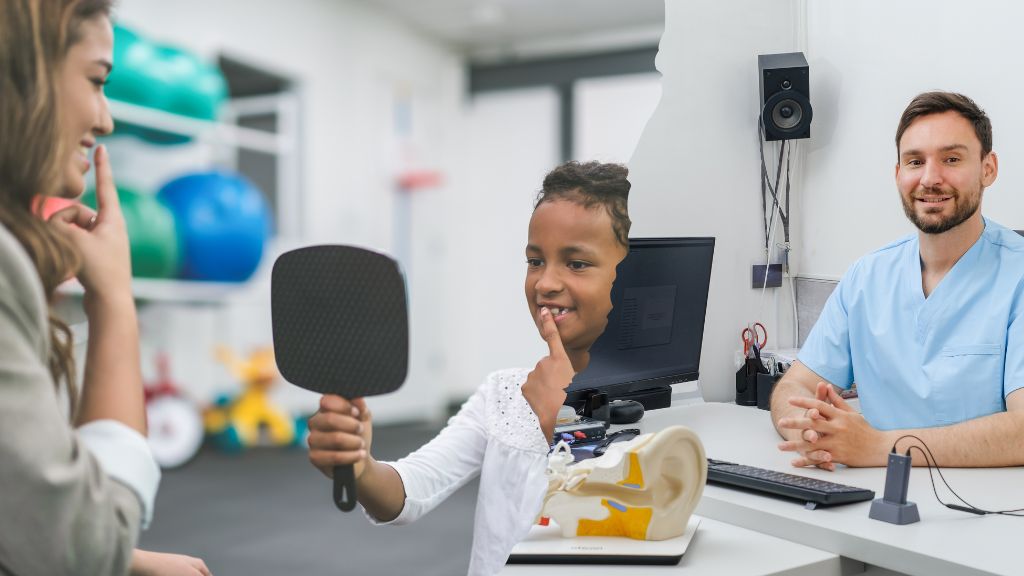How a Speech Pathologist Works with Schools to Boost Student Outcomes
How a Speech Pathologist Works with Schools to Boost Student Outcomes
Blog Article
Just How a Speech Pathologist Can Help Improve Communication Abilities
Efficient interaction is a cornerstone of personal and professional success, yet many people face difficulties that prevent their ability to express themselves plainly. A speech pathologist is outfitted to deal with these barriers through targeted assessment and treatment strategies tailored to each individual's demands.
Understanding Communication Problems
Understanding communication conditions is necessary for identifying just how they affect people' ability to reveal themselves and engage with others. Interaction disorders encompass a variety of problems that affect speech, language, and social interaction, frequently preventing efficient communication. These disorders can develop from numerous aspects, consisting of neurological problems, developing delays, physical impairments, or mental problems.
Speech disorders may manifest as problems in expression, fluency, or voice manufacturing, impacting just how words are obvious or talked. Language disorders, on the various other hand, entail difficulties in understanding or utilizing language, which can hinder both non-verbal and spoken interaction. Social interaction disorders are characterized by problems in the practical aspects of interaction, such as taking kip down discussion or understanding social cues.
The repercussions of interaction disorders are extensive, affecting not just the person's capacity to communicate feelings and ideas but also their social relationships, academic possibilities, and general lifestyle. Recognition of these disorders can promote empathy and assistance, motivating efficient strategies for interaction and interaction. Recognizing the intricacies of interaction disorders is a critical action in the direction of promoting inclusivity and resolving the needs of those affected.
Role of a Speech Pathologist
Speech pathologists often play a vital function in identifying and treating communication conditions, using a variety of evidence-based methods customized per individual's requirements. These professionals function with people throughout the life expectancy, from kids with speech delays to adults recovering from strokes or traumatic mind injuries. Their know-how encompasses a range of interaction problems, consisting of expression, fluency, voice, and language problems.
In restorative setups, speech pathologists use structured interventions designed to boost communication skills. They might implement techniques such as speech exercises, language video games, and social communication training to promote renovations in receptive and meaningful language abilities. Speech Pathologist. In addition, they enlighten clients and their households about reliable communication strategies and flexible methods to navigate daily interactions
Beyond direct treatment, speech pathologists collaborate with various other medical care caretakers, experts, and instructors to ensure a thorough approach to treatment. They advocate for customers by providing sources and support, making it possible for people to accomplish their communication goals and enhance their overall lifestyle. As experts in the field, speech pathologists are essential in promoting effective interaction, advertising self-reliance, and improving social engagement for those with interaction obstacles.
Assessment and Medical Diagnosis Process
The evaluation and medical diagnosis process carried out by speech pathologists typically includes a thorough examination to identify communication conditions precisely. This procedure begins with a comprehensive medical history, where the clinician gathers relevant info regarding the individual's clinical, educational, and developing background. Understanding the context of the individual's interaction problems is essential for a precise diagnosis.
Complying with the instance background, speech pathologists utilize casual evaluations and standard tests to assess numerous elements of interaction, including speech audio manufacturing, language understanding, expressive language, and social interaction abilities. These assessments are customized to the individual's age and details concerns, offering beneficial information for evaluation.
Observation is also a vital element of the assessment process, as it allows the clinician to see firsthand how the specific communicates in natural settings. In addition, interviews with family members and instructors can supply understanding into the person's communication difficulties across various settings.
When the evaluation is complete, the speech pathologist synthesizes the findings to determine a medical diagnosis and advise ideal interventions. This complete assessment procedure ensures that individuals get targeted assistance tailored to their unique communication needs, laying the foundation for efficient healing methods.
Restorative Techniques and Methods
Numerous restorative techniques and strategies are utilized by speech pathologists to resolve a range of communication disorders effectively. One extensively utilized approach is articulation therapy, which focuses on remedying speech seems through repetition and visual signs. This strategy is specifically valuable for individuals with speech audio problems.
One more efficient approach is language intervention, which improves both meaningful and responsive language abilities. This may involve interactive activities that advertise vocabulary development, syntax understanding, and conversational skills. Additionally, speech pathologists usually make use of social abilities training to enhance pragmatic language capacities, allowing people to browse social interactions more effectively.
Fluency shaping and stuttering alteration strategies are especially developed to assist those experiencing fluency conditions. These strategies assist customers develop smoother speech patterns and take care of the physical and emotional components of stuttering.
Furthermore, alternative and augmentative communication (AAC) systems are employed for people with extreme communication impairments. These systems, which can include gestures, icons, or electronic devices, supply essential assistance for efficient communication.
Benefits of Speech Treatment
:max_bytes(150000):strip_icc()/speech-pathologist-526069_final-f487a4e98ea448ea823292ded95e32f9.png)
In addition, speech treatment can help in developing crucial listening and comprehension skills, cultivating far better communication in discussions. Individuals with cognitive-communication disorders can also benefit, as therapy concentrates on strengthening memory and analytic capacities, important for efficient interaction.
An additional crucial facet is the psychological support provided during treatment sessions. Speech pathologists create a safe setting, motivating patients to overcome stress and anxiety and aggravation pertaining to their communication concerns. This assistance can cause boosted self-esteem and overall mental wellness.
In addition, early intervention through speech treatment can protect against more issues, making sure that individuals reach their full communicative possibility. On the whole, the advantages of speech useful site treatment expand beyond plain speech enhancement, favorably affecting various measurements of life for those influenced by interaction problems.
Final Thought
In summary, speech pathologists play an important duty in dealing with interaction disorders through evaluation, diagnosis, and tailored restorative treatments. By utilizing evidence-based techniques, these specialists enhance individuals' speech and language capacities, fostering enhanced quality, fluency, and social interaction abilities. The benefits of very early treatment underscore the relevance of looking for support from speech pathologists, as their knowledge can significantly improve communicative possibility, ultimately bring about higher success in both specialist and personal rounds.

Speech pathologists often play a vital duty in identifying and treating interaction see post conditions, employing an array of evidence-based methods customized to each person's demands. As professionals in the area, speech pathologists are important in cultivating effective communication, promoting freedom, and boosting social engagement for those with communication difficulties.

Report this page